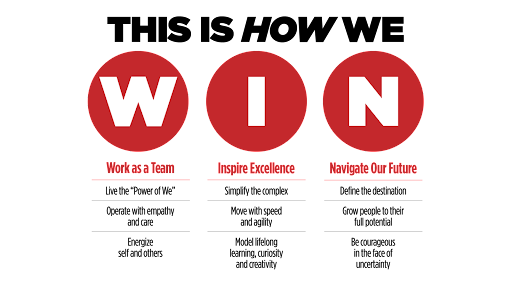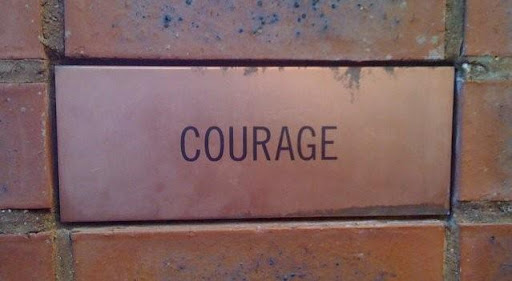On February 1, 2019, I made a professional commitment to learn something new every day and share it with my organization as the new chief learning officer at The Kraft Heinz Company. On January 31, 2020, I completed 365 Days of Learning, part of an effort to model what it looks like to #LearnLikeAnOwner and #MakeTimeForLearning in an organization undergoing a learning transformation.
As a result of that year of learning, I gathered 365 valuable lessons– which I share in my new book, “Let’s Learn Our Way Through It, Shall We?,” which was written to encourage others to commit to their own personal and professional learning journeys.
Consider with me, Lesson No. 80: Make a point to practice everyday courage.
In the summer of 2010, I had the privilege of visiting South Africa with my family to enjoy the very first World Cup on African soil. While I was there, we made sure to visit Nelson Mandela’s house. It was a small brick house in Soweto — full of awards, mementos and history. Throngs of people joined me at the small, refurbished house to pay homage to a giant of a man who touched so many lives while he walked the earth.Some of the bricks in the house were replaced with brass plates that had words of inspiration and motivation on them. I took pictures of many of those bricks — one of my favorites said simply: Courage.
I look at the picture of this bronze-plated brick whenever I feel that I am facing a large challenge or opportunity. Recently, I have found myself flipping through my pictures to spend some time contemplating this brick before tackling something important.
In addition to providing the boost that it always does, looking at the brick also reminded me of lesson No. 80 from the 365 Things I Learned From 365 Days of Learning: Make a point to practice everyday courage.
I’ve found this is something to be remembered every day — in life and especially in leadership.
On day 48 of My 365 Days of Learning, I read a great Harvard Business Review article titled ”Cultivating Everyday Courage” by James R. Detert. I recommend it; his work on courage in the workplace is illuminating. The article explores the idea of “competent courage,” and the principles that serve as guardrails for those who endeavor to be competently courageous. The article summary states: “Most acts of courage don’t come from whistle-blowers or organizational martyrs…They come from respected insiders at all levels who take action because they believe it’s the right thing to do. And when they manage the process well, they don’t necessarily pay a high price; indeed, they may see their status rise. People who succeed in their courageous acts, or suffer fewer negative consequences, tend to exhibit certain behaviors: They lay the groundwork for action; they carefully choose their battles; they manage messaging and emotions; and they follow up afterward.”
That article inspired me to recommit to “make a point to practice everyday courage.” Could you benefit from making that recommitment? What role are you playing right now in your life or in your work that requires you to practice everyday courage? Consider this:
- You may find yourself in a room where you disagree with the suggestions that are being made. You can decide to stay silent or be courageous and speak your mind. After all, if you are going to be in the room, you might as well be in the room, right?
- You may have to have a difficult conversation or make a difficult choice.
- You may make a conscious decision to operate outside of your comfort zone so that you can grow.
- You may decide not to fight a particular battle so you can position yourself to win the proverbial war.
- You may be called to interrupt bias when you see it, or to act as an ally for someone from an underrepresented or marginalized group.
- The time may come where you must advocate for yourself, for your worth in a negotiation or for a member of your team.
- You may have to decide if you will act in a way that is aligned with your values and priorities — or not.
These are all examples of opportunities to practice everyday courage. And let me tell you the key is the word everyday. Practice in low stakes situations so you are ready in high stakes situations.
Over the past two or so years, more than ever before, we’ve all been called to do our best to provide innovative learning and training opportunities to address the challenges that our employees and colleagues have faced and to keep people engaged and supported. Certainly, we all have much to celebrate and much to contemplate — about the choices that we’ve made, the challenges ahead and the opportunities that we have to meaningfully contribute to our organizations and our communities.

And it is important to celebrate. But before it is time to celebrate, often there is change to manage, and difficult questions to answer. When there are no clear answers to critical questions, the act of drawing from your core sense of who you are, what you believe and what your values are can be grounding.
During the course of a day at work, I often refer to the Kraft Heinz leadership principles, which are embedded in all our training and learning experiences. We expect our leaders to W-I -N: Work as a team, Inspire Excellence, and Navigate our Future. Each of those leadership principles pair with a list of associated activations. One of the activations for the third principle, Navigate our Future, is the expectation that every employee makes the choice to Be courageous in the face of uncertainty.
And, given the world we live in, that requires us to practice everyday courage. Courage to ask, to explore, to doubt and to discover.















